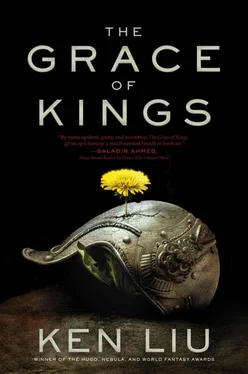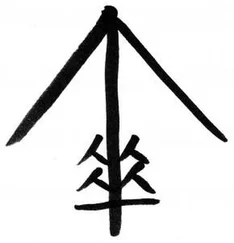Constructing a navy would take too long; she needed some way to cross the river, quickly.
Word spread along the Liru that the marshal was offering rich rewards for shipowners in Cocru to defy the hegemon and sail their ships to the northern shore of the river. A few daring merchants took the gamble, but their trading vessels were completely unprepared against airships. Burning wreckage, dead bodies, and the goods the ships had carried — chests of cloth, jars of oil, barrels of food, wine, flour — drifted down the river, bobbing along the surface like so many warnings against others who might think of betraying the hegemon.
Mazoti left the main body of her forces at Dimushi, facing the defenders in Cocru across the wide mouth of the Liru. She journeyed up the river, to Coyeca, a small town where the locals were famous for making earthenware: pots, vases, planters, and so on. These came in all shapes and sizes, some large enough to cook an entire shark in, others suitable only for brewing tea.
She wore a wig and dressed herself as a well-to-do lady from Pan who was here for pleasure, to sightsee and to pick out some suitable furnishings for the new house that would be built to replace the one that Hegemon Zyndu had burned down during the occupation. She browsed through the markets, fondling the earthenware vessels with obvious pleasure.
Dafiro, who was disguised as her servant, observed Marshal Mazoti’s actions with puzzlement. She had never shown an ounce of interest in the implements of domesticity before.
Small caravans of merchants began to arrive at Coyeca. They purchased many large pots and planters and jars and amphorae. The workshops of Coyeca were happy for the boost in business. The town had always relied on commerce up and down the Liru, but now that Cocru had sealed its borders and barred all merchant ships from the river, business had slowed to a trickle. These caravans from up north were very welcome.
Then, on a moonless night, the merchants of the various caravans, their servants and footmen, their drivers and errand boys, gathered on the shore of the Liru outside Coyeca. They unloaded the pottery they had purchased and unpacked uniforms and armor from the carriages.
Marshal Mazoti stood before them. She was dressed again in battle gear, and her face was filled with the satisfaction of a plan carried out to perfection. “Gentlemen, I’ve always said that we must make the most of every advantage we can get. Today, we put that credo into action. Mi and Solofi think they’re safe because they destroyed all boats in their desperate retreat across the Liru, but we don’t need boats. They think they can catch us whenever we try to build rafts, but we’ve been buying rafts right under their noses.”
She directed the men to stopper and seal the jars, amphorae, pots, and planters. They then tied collections of these air-filled vessels together with strong twine. To increase floatation, she had the soldiers fill their wineskins with air and tie these also to the makeshift rafts.
A Cocru airship drifted over the moonlit Liru. The lookouts leaned outside the gondola, keeping their eyes peeled for any ships or rafts on the surface. They saw bobbing masses of flotsam in the water below — clusters of jars and pots and other containers bumping against one another. Apparently, another greedy merchant had tried to make a run for it to the north with his ship, and a Cocru airship had made quick work of the traitor. It was a pity that perfectly good merchandise had to be ruined.
The airship sailed away.
In the darkness, undetected, the men of Dasu floated across the Liru on pockets of air trapped in kitchenware. The soldiers held on to the rafts with their hands and treaded water with their legs; they wore large pots over their heads to keep up the ruse. A few of the rafts fell apart, and some of the men, unable to swim back to the northern shore, drowned in the crossing. But most of the three hundred soldiers picked by Mazoti for this secret mission made it across safely.
After landing in Cocru, Mazoti’s men divided into small squads and made their way west along the river. The squads easily overwhelmed the small garrisons at dozens of river towns and liberated their ships, directing them to sail toward the northern shore of the Liru — the Dasu men did not hesitate to use whatever method of persuasion was most effective with the shipowners.
Even Cocru airships could not stop such a mass exodus.

Mata finally cornered Mocri, and Mocri invited Mata to duel.
From sunrise to sundown, the two matched blow for blow, strike for strike. Sweat poured off their bodies, and their breath became labored. But still Na-aroénna swung through the air like the lobtailing fluke of a cruben, and Mocri’s shield met it like the eternal, unyielding sea; Goremaw smashed down like the falling fist of Fithowéo, and Mocri’s sword parried it like the hero Iluthan turning aside the jaws of a wolf. When the sun finally sank and the stars blinked into the black-silk sky, Mocri stepped back and held his arms open.
“Hegemon!” His heavy breathing sounded like the gasps of an ancient bellows; his dry tongue could not even form the syllables properly; he stumbled and had to support himself by leaning on his sword. “Have you ever fought a man like me?”
“Never,” said Mata. He had never felt so tired, not even during the Battle of Wolf’s Paw. But his heart had never felt more joyful. “You’re the most skilled opponent I’ve ever faced.” Pity arose in him. “Yield. You have fought well, and I will leave you in charge of Gan if you swear fealty to me.”
Mocri smiled. “I am both glad and sorry that we met.” And he pulled up his sword, lifted his shield, and came at Mata again.
The stars spun overhead as two great shadows fought in their cold, faint light. Mata’s and Mocri’s soldiers watched their lords, mesmerized. As their movements grew slower and more deliberate with their exhaustion, the two men seemed to be engaged in a dance rather than a fight. A dance that few mortals had the honor to witness.
Finally, as the sun rose again, Mata’s strike with Goremaw broke Mocri’s shield, and he took a step forward and thrust Na-aroénna into Mocri’s chest.
Mata sheathed the Doubt-Ender and stumbled. Ratho Miro, his personal guard, rushed forward to support him. But Mata shook him off and picked up Mocri’s sword. It looked old, battered, unadorned, the edges of the blade full of notches and the handle slick with Mocri’s sweat: a weapon fit for a king.
He turned to Ratho. “Rat, you need a better sword, and this weapon deserves to not be buried in obscurity.”
Ratho accepted the sword gingerly, overwhelmed by the honor.
“What will you name it?” asked Mata.
“Simplicity,” said Ratho.
“Simplicity?”
“Ever since following you, my life has become as clear as the simple songs my mother sang to me as a child. My happiest memories are of that time and this.”
Mata laughed. “Well named. Most rare now is our old simplicity.”

Back in Toaza, the hegemon ordered that Mocri be given a funeral befitting his station as a king.
Mocri’s family would also be spared and continue to be treated as nobles — though they would have to live in Çaruza. Those who fought with Mocri to the end were pardoned. If they would now swear fealty to Mata again, they could even keep their ranks.
Mata’s men were confused. They had expected Mata to treat Mocri and his followers harshly, since they had betrayed him.
“Do you understand why?” Mata asked.
Читать дальше













